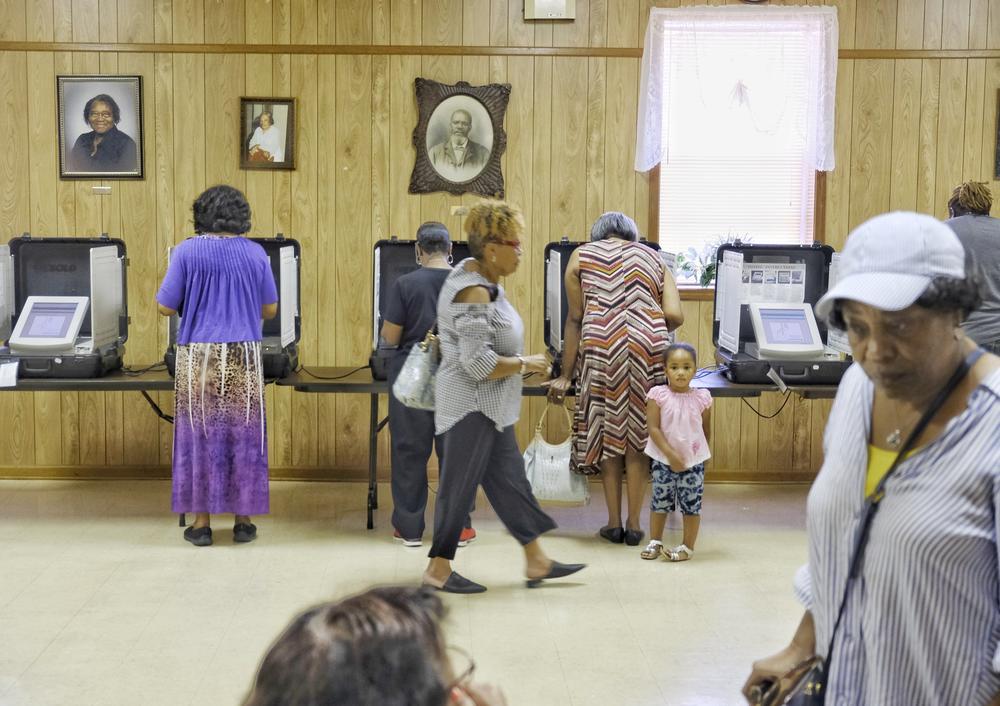Section Branding
Header Content
Why Are 53,000 Voter Registrations On Hold In Georgia?
Primary Content
On the final day of voter registration in Georgia, a report from The Associated Press found the Georgia Secretary of State’s office has more than 53,000 voter registrations on hold under the state’s “exact match” law.
The law states that an applicant’s status is marked "pending" if any information on their voter application form does not exactly match federal or state databases.
Many national outlets aggregated and shared the article, adding words like “purge” and “suppression” to the AP’s reporting, and suggested secretary of state and Republican gubernatorial nominee Brian Kemp was personally involved in preventing voters from casting a ballot.
In a statement announcing Georgia’s record-breaking number of registered voters, Kemp decried “outside agitators” and said it has never been easier to register to vote.
A contentious governor’s race between Kemp and Democrat Stacey Abrams has raised the intensity of this issue – the AP’s analysis of the applications found nearly 70 percent of those on hold are black.
Further compounding the controversy, the secretary of state’s office also says many of these registrations on hold came from applications filled out by the New Georgia Project.
The New Georgia Project is a voter registration group created by Abrams for the 2014 election cycle. The office says a number of registration applications had wrong dates of birth, were duplicates, or missing critical information.
So how did these voters get “frozen” and what can they do to fix problems with their registration?
‘EXACT MATCH’
In early 2017, the Lawyers’ Committee For Civil Rights and the secretary of state’s office settled a lawsuit that helped set the terms for the state’s system today.
The suit claimed Georgia’s “exact match” system violated part of the Voting Rights Act of 1965 by requiring an applicant’s full name, date of birth, driver’s license number of last four digits of their Social Security number to exactly match the state Department of Driver Services or Social Security Administration databases.
So, if a name is missing a hyphen or data is not entered correctly, the county elections officials who handle voter applications can then flag it as “pending.” Once that happens, the secretary of state’s office says the voter registration database will create and send a letter notifying the applicant of the problem.
The Georgia woman in the AP story, Marsha Appling-Nunez, said she never saw any notice from the secretary of state’s office that there was a problem with her application.
Under the settlement, Georgia no longer automatically cancels mismatched voter applications and moves them to a “pending” status with no deadline to correct the issue. During the 2017 legislative session, lawmakers passed a bill identical to the settlement, adding a new a deadline of 26 months to make the change.
How common is a registration application that doesn’t match?
In an Aug. 3 press release, the secretary of state’s office said the state processed more than 5.6 million voter registration forms from Jan. 2014 to Aug. 2018, and less than one percent of them were pending.
REGISTRATION FROZEN?
If you are one of the 53,000 voters whose application is on hold, or just questions about your voter registration, the only official source to confirm your registration is the state’s My Voter Page (https://www.mvp.sos.ga.gov/MVP/mvp.do).
Enter your name, county and date of birth to verify your registration, polling precinct, elected officials and sample ballots.
If your registration has been flagged, you will receive a notice to contact your county election office to confirm and correct your information.
The secretary of state’s office stresses that being on that list does not prevent you from voting on Election Day. If you do not mail in your proper identification before Nov. 6, you can verify your information using your driver’s license or state photo ID at the polls.
You can find your local county elections office here: http://elections.sos.ga.gov/Elections/countyregistrars.do
Be sure to read our in-depth look at how Georgia’s voting system works here.


